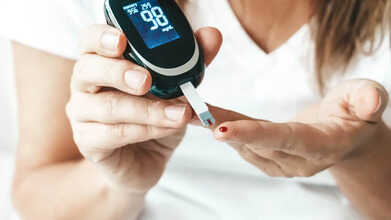- Health Conditions A-Z
- Health & Wellness
- Nutrition
- Fitness
- Health News
- Ayurveda
- Videos
- Medicine A-Z
- Parenting
- Web Stories
Ozempic Sober - Is The Popular Weight Loss Drug Making People Lose Interest In Alcohol?

(Credit-Canva)
A new study suggests that GLP-1 drugs like Ozempic and Wegovy, used mainly for weight loss and diabetes, might also lessen the effects of alcohol. While this could be disappointing for social drinkers, experts at Virginia Tech see it as a hopeful new way to help people who struggle with serious alcohol problems.
Alcohol addiction is one of the world’s biggest problems. According to the World Health Organization (WHO) in 2019 alone, approximately 2.6 million deaths worldwide were linked to drinking. While 1.6 million deaths were due to non-communicable diseases, the other 700,000 deaths were caused by injuries.
A massive number of people struggle with alcohol problems. An estimated 400 million people globally, about 7% of the world's population aged 15 and older, were living with alcohol use disorders (AUDs). A large portion of this group, 209 million people, or 3.7% of the adult population, had the more severe condition of alcohol dependence (or addiction).
The WHO explains that we have effective ways to control and reduce the harm caused by alcohol, and countries need to use these strategies more often. At the same time, it’s crucial for every person to know the dangers of drinking and take personal steps to protect themselves from their harmful effects. Could these weight loss drugs become one such viable ways to help bring alcohol addiction down?
How Does Weight Loss Medication Help Alcohol Cravings?
GLP-1 medicines work by copying a natural body hormone that manages your appetite and how you digest food. This makes people feel full longer and helps them eat less. For this small study, researchers tested 20 people who were overweight.
Half of them were already taking a regular dose of a GLP-1 drug. On the test day, everyone had an alcoholic drink after a snack. The researchers then watched them for an hour, checking their health and asking how they felt.
The key result was that the group on GLP-1 drugs felt less drunk, even though everyone had the same amount. Crucially, their blood alcohol level rose more slowly. Scientists think that because the drug slows down the body's processes, it slows down how fast the alcohol reaches the brain, which dulls the effects, or the "buzz."
This is important because slow-acting drugs are less likely to be abused. These promising results mean researchers want to run much bigger studies to confirm that GLP-1s can be a real treatment to help people drink less.
Benefits Of GLP-1 Medication
The ability of GLP-1 drugs to help with cravings doesn't stop at alcohol. People taking drugs like Ozempic have also reported having fewer cravings for nicotine, opioid drugs, and even less desire for impulse shopping. Other research has already shown this potential: Opioid users on GLP-1s had a 40% lower rate of overdoses in one study.
In a separate trial done by researchers from Loyola University Chicago, these medications were better than standard drugs for alcoholism at keeping patients out of the hospital for alcohol problems. Scientists believe this happens because GLP-1 drugs affect the brain's reward system (called the mesolimbic system), which controls addiction. They change the levels of a chemical called dopamine, which is central to how we feel pleasure and form habits.
New Study Suggests Targeting Belly Fat Can Prevent Prediabetes

Credits: Canva
Where fat accumulates in the body can be far more important than simply shedding pounds when it comes to lowering diabetes risk, a new study published in Nature suggests. For people with prediabetes, which is when blood sugar is higher than normal but not yet at diabetes levels, targeting belly fat specifically may have a greater impact than losing weight overall through lifestyle changes.
Halting prediabetes is critical, as nearly 70 percent of individuals in this category eventually develop diabetes. Reversing prediabetes also protects against complications like heart disease, kidney problems, and nerve damage.
What About Study Findings?
In the study, two groups of participants had similar overall fat levels but differed in how fat was stored. Those who lost more belly fat, or visceral fat, over a year were able to reverse prediabetes, while those who didn’t reduce abdominal fat did not reach healthy blood sugar levels.
Researchers from the University Hospital Tübingen in Germany found that focused lifestyle changes could bring prediabetic individuals into remission even without major weight loss. This remission was associated with a roughly 70 percent reduction in the risk of developing Type 2 diabetes over the following decade.
Among 1,105 participants with prediabetes, the study examined 234 individuals who did not lose overall weight. Of these, 51 achieved prediabetes remission after a year of targeted lifestyle interventions, while the remaining 183 did not reach healthy glucose levels.
Does This Study Hold Lessons for Indians?
“Weight loss remains the primary goal for people who are obese. However, reversing prediabetes can also happen without major weight loss, especially when lifestyle interventions focus on improving diet quality, increasing physical activity, and building muscle while reducing fat,” says Dr. Anoop Misra, chairman at Fortis C-Doc Hospital for Diabetes and Allied Sciences.
He adds that for Indians, reducing both subcutaneous abdominal fat and visceral fat is key for better metabolism. These changes, paired with increased muscle mass and improved functional capacity, enhance insulin sensitivity and help maintain long-term blood sugar control.
Why Abdominal Obesity Is a Priority
Belly fat, or visceral fat, releases inflammatory substances that interfere with insulin, the hormone that moves sugar from the blood into cells. To compensate, the body produces more insulin, which can overwhelm the pancreas and raise blood sugar. Excess sugar is often stored as fat around the abdomen, which is why even individuals of normal weight with a protruding stomach are at higher risk of diabetes.
What Lifestyle Interventions Help Reduce Belly Fat?
“Diet composition matters most lower carbs, higher protein, and healthy fats, all within a controlled calorie range, can help reverse prediabetes even without significant weight loss,” says Dr. Misra. Good carbohydrate sources include whole grains, fruits, legumes, and non-starchy vegetables, while healthy fats come from nuts, seeds, olive oil, and fatty fish.
Physical activity also plays a crucial role. Combining resistance training, such as weightlifting at least twice a week, with aerobic exercises like walking, running, or swimming, is effective at reducing visceral fat. Adequate sleep around seven hours per night is also essential to keep blood sugar levels under control.
Google Vs Chat GPT: Study Finds Which Medium Give Better Health Advice

(Credit-Canva)
Search engines like Google and Bing, and AI chatbots like ChatGPT and GPT-4, are now major sources of health information. But how reliable are they?
A new research published in the NPJ Digital Medicine tested four major search engines and seven different large AI models, including leading programs like ChatGPT and GPT-4, by asking them 150 medical questions. Their study looked at how accurate the answers were, how much the results changed based on how the question was asked, and whether giving the AI access to search results helped.
Which Gave Better Answers: AI or Search Engines?
While AI Chatbots, with 80% accuracy, generally outperformed Search Engines, with 50-70% accuracy, on direct health questions, the study found that AI chatbots are good, but their mistakes are worrying.
Confidence in Errors
The biggest and most dangerous problem was that the AI sometimes gave confidently wrong answers that directly disagreed with established medical facts. This is highly risky in a health setting.
Overall Accuracy
The AI chatbots generally did better than search engines, correctly answering about 80% of the questions. The best performers were typically GPT-4, ChatGPT, Llama3, and MedLlama3.
Precision Problem
Search engines like Google usually return answers that are correct when they directly address the question, but they often clutter the results with information that is incomplete or off-topic. They struggled with giving a straight "yes" or "no" answer.
User Habits
The study simulated a "lazy" user, who just trusts the first answer, and a "diligent" user, who checks three sources. Surprisingly, the "lazy" users were sometimes just as accurate as the diligent ones, suggesting that top-ranked results are often good, but this is a risk if a highly ranked answer happens to be wrong.
Bing was the best among search engines, but it wasn't significantly better than Google, Yahoo!, or DuckDuckGo.
How You Ask The Question Matters
The AI's accuracy was highly sensitive to how the question was phrased. Using an "expert" prompt like asking the AI to cite reputable medical sources generally led to better, more medically sound answers, even if they were sometimes less direct.
Giving the AI the top search results before it answered (retrieval augmentation) usually improved performance, especially for smaller AI models. However, this didn't always help; if the search results given to the AI were irrelevant or low-quality, the AI's answer could actually get worse. More information isn't always better.
Things to Keep In Mind
Some points noted by the researchers was,
- Questions about COVID-19 were easier for both AI and search engines, likely because of the huge amount of data available about the pandemic.
- While AI is powerful, its tendency to be swayed by how you word the question and its confident errors mean we need to be very cautious about using it for medical advice.
- The overall conclusion is that AI models are promising for health information, but they are not yet fully reliable on their own. Combining them with high-quality search results is likely the best way forward, but only if the search results fed to the AI are trustworthy.
Eye Movement Tracker Can Reveal The Risk Of Alzheimer's Years Before Symptoms Appear: Study

(Credit-Canva)
A recent scientific study found an exciting new way to check if someone is likely to get Alzheimer's disease due to their genetics. Instead of current medical tests, which are often costly, complex, and invasive, this new method uses simple eye-tracking technology. This means diagnosing the risk could become much easier for patients and more affordable for healthcare systems.
As you may know, there is currently no cure for Alzheimer's disease. This is a neurodegenerative disease that can affect a person’s memory, skills, as well as behavior. The best way to deal with this disease is by diagnosing it early, so that doctors can provide medicine and treatment options to delay the onset and manage the symptoms. However, it is not easy to spot the symptoms, so how can one know for certain whether they have Alzheimer's disease or not?
How Can Eye Trackers Detect Alzheimer’s Disease
This research, which involved scientists from the University of Strathclyde, looked closely at how well this new technique works. The technology is a specific system called ViewMind Atlas. It works by monitoring a person's tiny, subtle eye movements. Then, Artificial Intelligence (AI) software analyzes these movements.
Since the eyes are closely linked to the brain, the way they move can tell doctors about the brain's health and function. The most important part is that this system can successfully identify the genetic risk in people years before they start showing any actual memory loss or other Alzheimer’s symptoms.
How Accurate Is This Eye Tracking Test?
To test the system, the researchers studied a group of people from extended families in Colombia who have a known genetic mutation that causes Alzheimer’s. The results were incredibly promising:
For the family members who were already showing symptoms of the disease, the ViewMind Atlas test was 100% accurate in identifying them.
More remarkably, for those who carried the gene but didn't have any symptoms yet (asymptomatic), the test was 96% accurate at correctly identifying their risk. The AI model essentially learned to look at the patterns of eye movement and use them to tell apart the people who had or were likely to get Alzheimer's from those who weren't.
Can This Help Improve Early Diagnosis Rate?
The research team found this eye-tracking test detects the disease earlier than standard cognitive tests, which often fail to flag a problem until it is well underway. The lead scientist, Professor Mario Parra Rodriguez, explained why this is such a big deal. He pointed out that today's common tests are "expensive and invasive," often requiring hospital procedures.
The ViewMind Atlas system, however, helps doctors predict Alzheimer’s risk years in advance. This is key for doctors, who often struggle to figure out if a patient’s mild forgetfulness is just a normal part of getting older or a serious risk of dementia. This new tool could help them act quickly to treat or manage the risk instead of having to wait for the disease to fully develop.
© 2024 Bennett, Coleman & Company Limited

